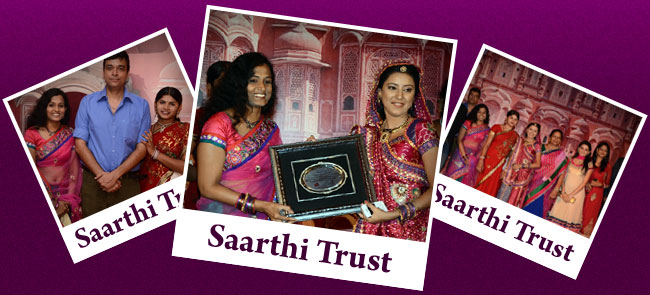We continue our interview of Kriti Bharthi. In this part of the interview, she talks more about the Saarthi Trust, of which she is the Managing Trustee.
Kriti established the Saarthi Trust in December of 2012 with the dream of rehabilitation for the needy. In the first month after establishment, Saarthi Trust made history by annulling the first ever child marriage in India. This major accomplishment is recognised by Limca Book of Records in their special edition of 2013.
You can read the first part of her interview here.
________________________________________________________

6. “Death threats have become a part of my life now and I have come to accept it as part of this job.” You have organised the rescue of child brides before the marriage takes place, which has put you in great danger. What kind of hostile reactions have you experienced in your work and how do you stay strong?
Well, I have experienced countless death threats and attacks as hostile reactions by the community during the process of annulment of Child Marriage or rescues of Child Brides/grooms to save them from forced marriages. The tradition of Child Marriage is deep rooted and centuries old in India’s largely patriarchal society. Fighting age-old customs in India is fraught with dangers. Some orthodox communities will go to any lengths to protect this deep-rooted malpractice. They do not think twice about hurting or even killing anybody who stands in their way.
Threats and attacks are increasing day by day to harm me. Even my mother has been threatened by these community members in their attempts to stop me or to force me to leave particular cases. I just want to share here that in many of my cases I was alone fighting against 500 to 700 people who were standing against me and threatening me to leave the case. Even Police and Administration fear getting involved in such cases. I think this is probably the reason that we are the only organisation in India who is working for the annulment of child marriages.
7. It has been reported that you are the first NGO to have a child marriage annulled. Please tell us more about this recent case.
Lakshmi was a resident of Luni Village of Jodhpur district. At the age of 1 she was married to a 3-year-old boy – Rakesh of Satlana village. When she reached puberty, she came to know that she had been married as a toddler. It was a shocking moment for her as she still considered herself an unmarried girl. When she came to know her husband and his family, she came to fear that her marriage would put her at risk of abuse and exploitation.
During her initial attempts to delay the ritual of Gauna (a ritual when maternal family sends their daughter to her in-laws home forever), her in-laws made an attempt to abduct her. I got involved with the case at this point to help Lakshmi. This was the time I discovered a permanent solution to the problem of child marriage: I researched the Laws regarding child marriages and I found a section in Prohibition of Child Marriage Act about Child Marriage Annulment that was not being enforced as it was a fairly unknown law.
The conclusion was that I advocated to bring this law to light and was able to enforce Child Marriage Annulment for Lakshmi. Afterwards I came to know that this is the first time this law was enforced in India . As this was the first Child Marriage Annulment in India so Saarthi Trust was honoured and recognised in the special edition of Limca Book of Records.
8. What is the most effective approach to end child marriage in India?
We have identified three practical solutions: annulment of child marriage, the development of a child helpline to provide information and counselling, and involvement of community members through education and workshops to effect change at the cultural level. Along with this, members of community will help take care of the victim’s rehabilitation process. So the involvement of Panchayats, women groups, other organisations are very important in vanishing of child marriage. They are allies and are the soldiers of my unique army of the common person.
9. We understand that your charity runs on a very small budget. How can our readers support your charity?
Your readers can support our direct operational programmes in these ways: by direct donations of monies to be used for our programmes, by volunteering or begin an interns, by providing facilities and other things we need to operate such as transportation vehicles, helpline equipment, and counselling.
10. In your considered opinion, how can we end violence against women for good?
Women and children are considered the weakest human beings in the world, especially in India. To end violence against women we have to start from beginning, by teaching males to respect women, by protecting women and girls from harm, and by raising girls who are strong and assertive. We can work to modify the behaviour of parents and teach them to be positive role models. We can also work to modify our society to eliminate violence and abuse and to enforce the policies designed to protect women and girls from violence. We should also acknowledge and praise women who have achieved gains in ending violence against women.